During the Gold Rush, prospectors, mostly men, flooded into San Francisco from all over the world. Most came from the Eastern United States, but also from outside of the country, especially Chile and China. Chinese gold-seekers made up a significant portion of the new 'settlers', setting up communities in San Francisco and in rural areas too.
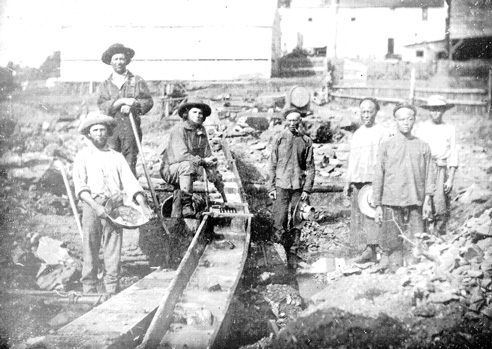
This 1852 photo by J. B. Starkweather shows a rare site: Chinese and European Americans working together in a gold mining operation.
Over the next few decades, Chinese immigrants became involved in a wide-range of work: Rurally, Chinese settlers created the fishing industry here, established agriculture in the Central Valley, and worked as laborers building the levee systems on the Delta, almost always living in isolated, Chinese-only communities. By the 1860s, 2/3 of the laborers building the Western portion of the transcontinental railroad were Chinese men.
In urban settings, Chinese workers took jobs in just about every trade: manufacturing, building, and running small businesses including laundries, restaurants, markets, and repair shops. Around the Bay Area, traveling Chinese peddlers sold fresh produce out of large baskets that they'd carry from house to house, and later from the back of horse-drawn produce carts.
Like many immigrants, new arrivals from China tended to stick together in the same neighborhoods, seeking out and forming supportive associations with people who came from their same regions and extended families back home. But the segregation of Chinese men and women into Chinatowns wasn't just a preference of the residents there. It was mandated by law and required for safety.
It would be difficult to exaggerate the level of hostility and violence directed towards Chinese-Americans in the late 19th century. Before I started reading about this a few weeks ago, I had no idea how overwhelming and horrific this bit of history was: white Americans, encouraged by labor leaders and sometimes officially sanctioned by local governments, perpetrated a series of pogroms against Chinese communities throughout the late 1800s. A few examples:
- In 1871 in Los Angeles a brutal race riot left roughly 20 Chinese men dead, after white residents ransacked Chinatown there.
- In 1885, in Wyoming, European immigrant mine workers rioted against Chinese workers (who were paid less than white workers and who had historically been recruited as strikebreakers), killing 28 Chinese miners and destroying 75 of their homes.
- In 1886, virtually every Chinese resident of Seattle was rounded up in an attempt to remove them from the city.
- In 1887, 31 Chinese gold miners were murdered by bandits in Oregon, and no one was prosecuted for the murders.
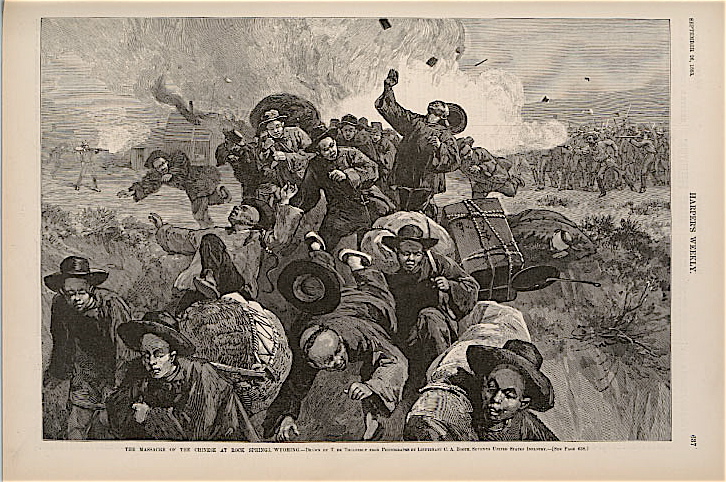
"Massacre of the Chinese at Rock Springs, Wyoming" From Harper's Weekly housed at the Bancroft Library, University of California, Berkeley
Legal repression of Chinese immigrants escalated dramatically as the years progressed: By 1852, Chinese gold miners were subject to a significant foreigner tax that no other international miners were required to pay. Two years later, the Supreme Court of California extended to Chinese people a ban already in place prohibiting 'Negroes' and 'Indians' from testifying for or against white people. In 1872, Chinese people were barred from owning real estate or business licenses in California. And devastatingly, in 1882, Congress enacted the Chinese Exclusion Act, barring Chinese laborers from entering the country. This ban was generally applied to almost every Chinese person, making it impossible for example for Chinese men already living in the US to bring their families here to join them. (And because the immigrants who came here from China were almost exclusively male, and because the Exclusion Act prohibited anyone else from coming, the Chinese community dwindled as its bachelor class aged without raising children.) The Chinese Exclusion Act wasn't repealed until the 1940s and the severe immigration quotas reserved only for Chinese immigrants weren't ended until 1965. 1965!
Theorists and intellectuals fell over each other advocating for the removal of Chinese people from this country. Here's a fairly typical anti-Chinese screed of the time, devoted to the "Chinese Question". I confess, I didn't read this whole steaming pile of garbage, and instead skipped to the final chapter (starts on 196) titled "One course, and one course only, can stay the Eastward migration of the yellow race, and its gradual conquest of the land." You can guess what course that is. 'Progressive' non-Chinese thinkers tended to advocate for Chinese immigrants solely on the basis that they were willing to do the tedious, humiliating, or back-breaking work that white people were refusing to take. Hmm, sounds familiar.
Government leaders and others in the mainstream were certainly responsible for the legal sanction of racism here, but labor leaders in particular should be held culpable for the anti-Chinese hysteria of that time. By the 1870s, the country was experiencing a post-Civil War economic downturn. Jobs were hard to come by. In California, the gold that so many people had flooded in to find was already mostly gone by the early 1850s. Meanwhile, the monopolistic railway companies (and most other industries), exploited Chinese workers by paying them less than the going wage for white workers. Instead of directing their hatred solely at the Goliath-like industrial giants, white labor turned to a seemingly easier target. A couple quick examples:
Samuel Gompers, founder of the AFL, co-authored a paper entitled, "Some Reasons for Chinese Exclusion. Meat vs. Rice. American Manhood against Asiatic Coolieism. Which Shall Survive?"
I'm not going to reproduce the most grossly offensive posters, pamphlets, and cartoons I've found that were produced by labor advocates in opposition to the Chinese, but here's a typically racist 1889 poster promoting a boycott of a business that was rumored to have hired Chinese workers: It's from the California Historical Society.
In San Francisco, anti-Chinese sentiment was common. The city's most famous anti-Chinese 'advocate' was Dennis Kearney publicly advocated rioting against both bosses and Chinese people at the old Sand Lot near City Hall.
White labor's anti-Chinese hysteria was horrifying, and it was also a missed opportunity. Directing rage towards immigrants (rather than business owners) didn't change labor conditions, or make workers wealthier. As usual, bigotry trumped solidarity.
Anti-Chinese violence peaked in the 1880s, but it's probably obvious that anti-Chinese sentiment (and legislation) wasn't over. It wasn't until WWII that there were significant improvements in legal and living conditions for Chinese people living here. And of course, racism directed at Chinese-American's is still a major issue. A 2001 phone study indicated that one in four Americans has 'strong negative feelings' towards Chinese Americans.
I'm going to close this out for now. Next week I should have some more on Chinese resistance to racism.
Signing off,
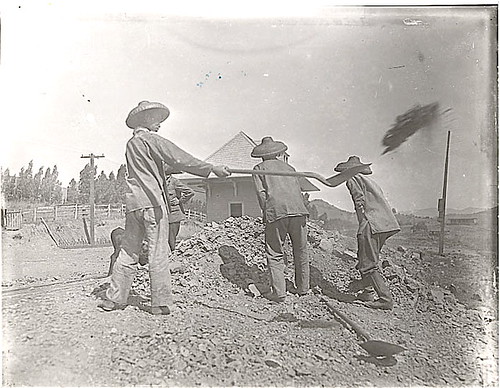
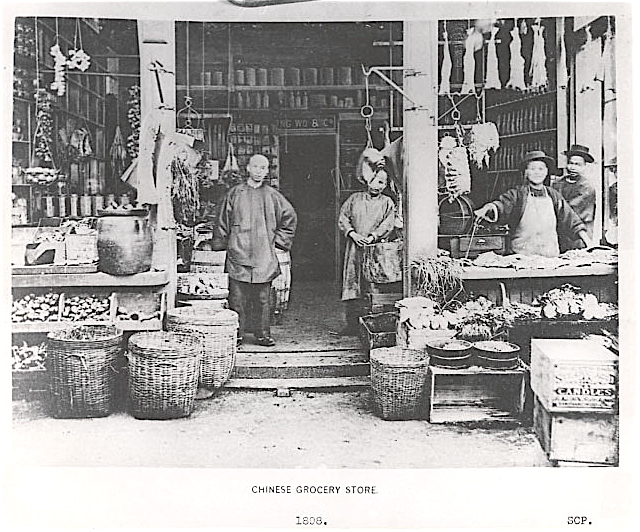
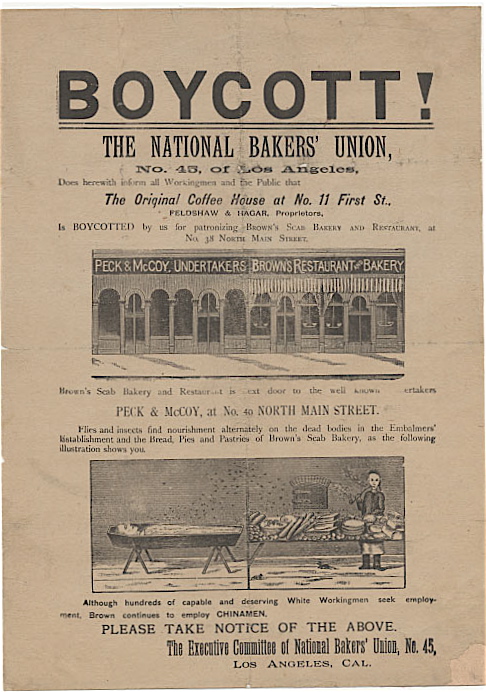
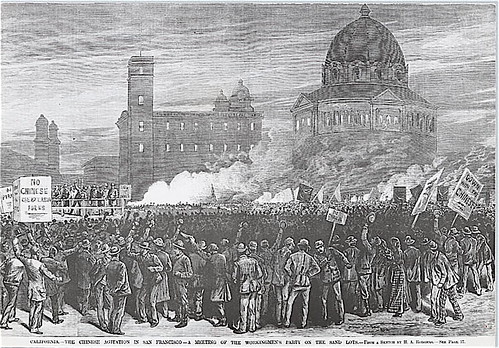

3 comments:
Oh my lord, I didn't realize it was quite so horrific. Thanks for an eye opener.
This is typical of the United States. My ancestry is European American and I grew up in the white world in the deep south in the 1960s. Although I "bleed red, white and blue", our country has a shameful history of genocide and violence against other peoples. This nation was built on this kind of thing and it continues today. Why are European Americans and other white people so afraid of people of another color? Why are their agressions directed toward the wrong people? I have done extensive research into the slavery issue and the treatment of African Americans since the time of the civil war through now and it is disgusting that European Americans and the other white peoples were able to legally get away this kind of violence towards other human beings. How cowardly can anyone be to get together in a crown and hurt, maime and kill others. I am sickened by our history. I have to agree with Michelle Obama when she states that "up until now, I have been ashamed of my country." We are no better than any other nation existing in the past or present, although we like to think we are. What a shame that such a great nation still harbors such bigotry and hatred.
Hmmm... I'm Asian, and I knew that there was intense hatred towards us by a few individuals. I never knew the entire full scale of it (I'm only in High School right now) and I agree with Anonymous. I also hope that other scarred individuals of all races, as well as Asians, can come to forgive the ignorant bigots. Why fight fire with fire when all that remains are ashes?
Post a Comment